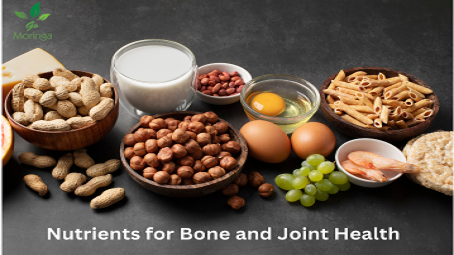Nutrients That Help With Bone & Joint Health
- Calcium:
We’ve all heard the term “calcium deficiency” since childhood. Often used as a threat for not having enough milk and later as actual bodily condition adults suffer from. Calcium is primarily important for keeping the bones healthy and strong as well as supporting muscle control and blood circulation. Since the human body does not produce calcium naturally, it is important to inculcate foods that provide the body with adequate calcium because when your body is deficient in calcium it starts removing calcium deposits from the bones itself which leads to osteoporosis.
Dairy products like milk, paneer, Dahi are rich in calcium however if you are looking for non-dairy calcium-rich foods; Soyabean, Beans, Legumes, Leafy greens are a few of them and can be found easily around you.
- Vitamin D:
Vitamin D and the sun have been synonyms for each other in our households for as long as we can remember. The body requires Vitamin D in order to adequately absorb calcium from food items. While our bodies generate Vitamin D on exposure to sunlight, excessive sunlight can result in bodily exposure to UV radiation leading to skin cancer. Thus, while obtaining Vitamin D from the sun is important it is equally important to consume foods rich in Vitamin D like Eggs, Fortified Orange Juice, Fortified Milk, Fish, and Mushrooms.
- Vitamin C:
Vitamin C is known to help lower the risk of joint problems and inflammatory arthritis-like conditions. However, it is important to consume Vitamin C in a perfect proportion which has been recommended as 75 milligrams for women and 90 milligrams for men. While this is almost impossible to calculate every day consuming fruits like Mango, Orange, Aamla (Gooseberry), Pineapple and Lime amongst other extensive sources of Vitamin C extending to berries and the like are naturally existing perfect proportions for consumption of Vitamin C.
- Sulforaphane:
This nutrient has the ability to block enzymes that cause damage to the joint cartilage and assist in reducing inflammation as well. Both of these functions are of great help to patients with osteoarthritis. Sulforaphane can be found in foods like Cauliflower, Broccoli, Sprouts, Cabbage, and Watercress to state a few available easily in your homes and vegetable market.
- Anthocyanins:
Anthocyanins are responsible for providing fruits with their pigment and are extremely supportive in lowering levels of C-reactive protein which is a marker of inflammation. Anthocyanins are antioxidants and are found in red and purple fruits, blackberries, raspberries, plums and eggplant (Suran).
However, it is important that you consume all of these nutrients and not skip on any or rather choose only one. These nutrients are responsible for your bone and joint health and shall be consumed in accordance with the same. If you wish to fight health issues and build a healthy future for your body with the simple means of a diet, connect with Dietician Priyatama Srivastava to get your specially curated diet plan and take the leap towards a healthier way of living.



